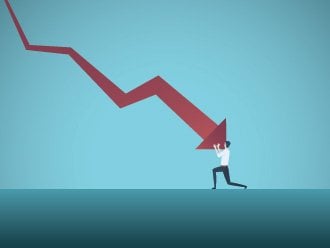The longest bull market in history could be coming to an end. The Dow lost 1,000 points on Feb. 24 (Monday) alone, and lost 12% that week. Though it recovered some of those losses, many investors still think the worst is yet to come.
Are they wrong? Or will the coronavirus cause a recession?
The COVID-19 coronavirus has spread to every continent by now. And unfortunately, it looks like the market impact will only get worse before it gets better.

Wall Street is most worried that COVID-19 could start the next recession.
When supply chains are disrupted by people staying out of work, productivity shrinks. Earnings follow, and companies start cutting back. From there, consumption goes down, and savings go up. And the markets tank all the while.
What’s important here is that we don’t actually need an official recession for this to happen. A recession is defined as two consecutive quarters of negative GDP, which means we might not know if a recession is happening for up to six months.
But the stock market will feel the effects of a slowdown in real time. Wall Street doesn’t need an economist to tell them we’re in a recession when they can see earnings dropping or businesses closing.
And it gets even scarier.
Money Morning Founding Editor Bill Patalon actually says the markets have been waiting to correct for a long time. And the coronavirus is just the catalyst to make that happen. He calls it the “Infection Correction.”
Bill points to a time in early 2018, when the S&P 500 was trading at its “highest forward P/E” since May 2002.
His view is that stocks were overpriced at that time. And since then, that distinction is made clearer as earnings forecasts are cut. Analysts at Goldman Sachs Group Inc. (NYSE: GS), for instance, cut corporate earnings projections by 13% for 2020.
With stocks already overpriced, the coronavirus is a very real threat to the stock market. It could be the straw that breaks the camel’s back after a long year of economic uncertainty.
The coronavirus is a “Black Swan” event. That means it’s a completely unpredictable event that disrupts the market from the outside. And that’s why no one can predict how the coronavirus will ultimately affect the market.
But there are measures you can take to protect yourself.
We’ll share how you can protect your money, too. But first, there’s more to the recession story than the coronavirus, and it’s why the pandemic is such a threat to your money...
Spotting Signs of a Recession
The markets had enough to worry about last year without a novel coronavirus.
U.S.-China trade talks were rocky at best. The United States has so far placed tariffs on $550 billion in Chinese products, and China has responded with tariffs on $185 billion of U.S. products.
By the end of 2019, China’s GDP growth was 6.1% - the slowest it had been since 1990. And investors feared this could ripple into the global markets.
When the world’s largest economy struggles, everybody struggles. U.S. GDP growth also stagnated early last year, falling to 2% from 2018 highs of 3.5%. Freight shipments slowed down, and manufacturing slowed to a decade low.
Manufacturing, as a matter of fact, is already in recession on its own, as a sector. It’s experienced two consecutive quarters of negative growth so far.
Concerns ramped up on a few other potential recession signals to accompany the GDP slip.
Possibly the biggest red flag was the inverted yield curve in August, when short-term bond yields rose higher than long-term yields. This was eventually overturned, but it added to speculation that the bull market had gone on too long.
Corporate earnings also slipped last year. Analysts at FactSet had expected 7.6% earnings growth from the S&P 500. But it came out to 2.3%.
Plus, safe havens like gold went up, a sign investors are looking for stability.
The U.S. economy spent all last year building a house of cards. And COVID-19 could be the thing to blow it down.
But keep your feet on the ground. The more volatile the market gets - the VIX has more than doubled in the last couple weeks - the more important it is to be realistic and stick to what you know.
That’s why these strategies are best for keeping your money safe right now…
How to Protect Your Money No Matter What
[mmpazkzone name="in-story" network="9794" site="307044" id="137008" type="4"]
The way to manage uncertainty like this is to stick to what you know. Responding to unpredictability, you want to look at the most fundamentally predictable investments around.
Here’s how you can help yourself in the lead-up to a potential recession.
- Buy Safe-Haven Assets
Specifically, start buying gold. Its value will increase if cash loses value. Stability like that in a time of great volatility is the envy of many investors. And it’s not even like you need to dump your life savings into gold. You could simply balance your riskier stocks with a 5% solid gold allocation.
SPDR Gold Trust ETF (NYSEArca: GLD) is an easy way to do this. It’s one of our most liquid, reliable trackers of the gold price.
- Buy Discount Blue-Chips
There is no better time to buy stocks like Amazon.com Inc. (NASDAQ: AMZN) or Alphabet Inc. (NASDAQ: GOOGL) at a discount.
Amazon was trading over $2,179 at the start of the year. But it’s down to $1,949 today. That’s an opportunity for an 11% pop from the planet’s most formidable e-commerce giant.
That’s just one example. Any buy-and-hold stocks on your wish list that you might have thought were too steep before - look at them now for a great deal.
- Buy Put Options
If you have the risk tolerance for it, options trading can be a great way to profit from dropping stocks. Tom Gentile, Money Morning’s options trading specialist, recommended a play on Carnival Corp. (NYSE: CCL) a couple weeks ago that could have earned you more than 400% up to now.
Cruises were making headlines for spreading the coronavirus, and the overall travel industry has pointed downward. This meant Carnival would head into a slump.
So Tom bought a $40 put contract expiring April 17, for just $160. Today, that contract hit $900. That’s more than 450% added to a $160 investment.
And Tom has plenty more where that came from…
Action to Take: Don’t panic. The markets are at their most unpredictable right now. That means it’s time to stick to the fundamentals. In times of uncertainty, hold on to assets that are certain, such as gold. And look for discounts on blue-chip stocks like Amazon.com Inc. (NASDAQ: AMZN) or Apple Inc. (NASDAQ: AAPL). If you want a little more risk, buy put options in an industry you think may be affected by the downturn.
Learn How to Harness This Powerful Options Trading Secret for Yourself
Live from his private office in Florida, America’s No. 1 Pattern Trader is revealing his most lucrative options trading secret yet.
It’s the reason he’s able to make such fast, profitable moves on companies like Netflix, Apple, Facebook, even Amazon – the reason he’s able to see major paydays long before they happen.
We’re talking about the potential to see the future of any stock on the market.
And Tom Gentile’s going live to show you exactly how to do it.
Believe it or not, it’s as easy as a few simple clicks of your mouse…
In no time at all, you could be lining up trade opportunities one by one and watching as your account grows bigger and bigger.
Follow Money Morning on Facebook and Twitter.
About the Author
Mike Stenger, Associate Editor for Money Morning at Money Map Press, graduated from the Perdue School of Business at Salisbury University. He has combined his degree in Economics with an interest in emerging technologies by finding where tech and finance overlap. Today, he studies the cybersecurity sector, AI, streaming, and the Cloud.



